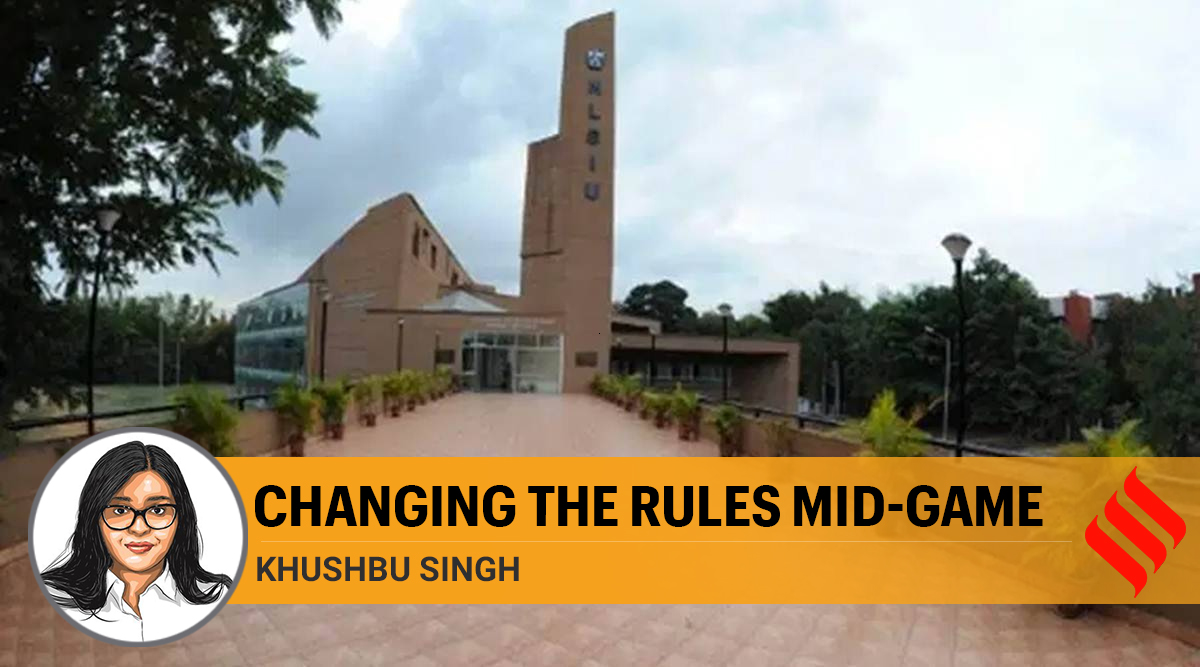 NLSIU has suddenly decided to part ways with CLAT and conduct its own entrance examination. (File Photo)
NLSIU has suddenly decided to part ways with CLAT and conduct its own entrance examination. (File Photo)Can you imagine what would happen if half-way into a Test match, the teams were told that it was now going to be converted into a T20 game? Even a Virat Kohli would struggle to score in the face of such an abrupt change. This will sound familiar to the 2020 law school aspirants awaiting entrance examinations. The National Law School of India University (NLSIU), Bengaluru, has suddenly decided to part ways with the Consortium of National Law Universities’ annual Common Law Admission Test (CLAT) and conduct its own entrance examination. And it thought it alright to announce this new exam giving the students little more than a week to prepare. The apparent reason for introducing a new entrance examination is that they want to avoid a Zero Year in the event that CLAT 2020 gets indefinitely postponed due to COVID.
There was a time before CLAT was introduced in 2008 when every college and university conducted separate entrance examinations, causing students much mental and physical stress — not to mention economic hardship. Directed by the Supreme Court in Varun Bhagat v. Union of India, CLAT was lauded as a step in the right direction.
In what has been a major reform, a move towards common entrance examinations in a variety of fields has been the norm over the last couple of decades. NEET (National Eligibility cum Entrance Test), JEE (Joint Entrance Exam) and the recently approved NRA (National Recruitment Agency), a multi-agency body which will conduct a single entrance exam for tens of thousands of positions for non-gazetted vacancies in both central government departments and public sector banks are some examples. NLSIU’s decision to introduce the break-away NLAT in a new, truncated format — 40 questions in 45 minutes — is not only regressive but also insensitive to the plight of the students. It is possibly also violative of certain provisions of the Constitution.
Courts across India have held that a contract, tender or a binding MoU cannot be changed in the middle of the game or after it is over, especially when it affects the outcomes. NLSIU has done precisely that.
Law aspirants prepare for years for the entrance examinations to the coveted NLSIU. Annus horribilis, 2020, just got worse. AILET and CLAT were two different examinations with similar patterns and a common syllabus till recently. Earlier this year, CLAT decided to change its pattern and now NLAT has been introduced. So, we now have three different examinations in three different formats — one being instituted at a week’s notice in the backdrop of a rapidly deteriorating pandemic. Coronavirus might be an “Act of God”, but this disaster is certainly an “act of man”.
Even after five years, the online in-centre CLAT continues to be marred by controversies, hence the consortium decided to conduct CLAT 2020 in the manual mode. NLSIU’s decision to jump from a manual to online at-home exam may at best be termed as a leap of faith as an online at-home exam while good in theory, is still a work in progress. Moreover, NLSIU seems oblivious to their online at-home entrance examination being discriminatory and favouring the privileged. It completely discounts students with limited access to a laptop, uninterrupted internet, reliable power supply and the other specifications laid down in the exam guidelines. NLSIU is gambling by changing the format as well as the mode of examination. Eventually, NLSIU may save a year but will be a net loser if it does not get the best students. The only party benefitting from this arbitrary, unilateral decision are the coaching centres who are already exploiting the stressed, overburdened and overwhelmed students by introducing new coaching material and test series tailored for NLAT.
NLSIU might have had genuine grievances and concerns but this is a case of throwing out the baby with the bathwater. A spirit of accommodation is the basis on which any consortium exists. NLSIU and the rest of the consortium should have worked harder to resolve the issues keeping the best interests of the students in mind rather than setting a bad precedent for the other NLUs to emulate. The Kenyan aphorism “When elephants fight, it’s the grass that suffers” aptly applies to the current situation with students becoming collateral damage.
NLSIU has acted in contravention of the memorandum of understanding, ex-facie violated the by-laws of the Consortium, prima facie violated Article 14 and Article 21 of the Indian Constitution and has exhibited a shocking level of indifference to the plight of students. With the Supreme Court seized of the matter, the fate of NLAT still hangs in balance.
This article first appeared in the print edition on September 12, 2020 under the title ‘Changing the rules mid-game’. The writer recently graduated from Jindal Global Law School.